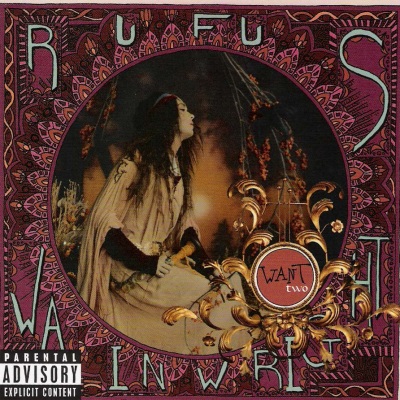
Want Two
by Matt Collar Picking up where Want One left off, Rufus Wainwright's Want Two is a deeply introspective, sometimes kinky, and often personally critical set of mini-operettas that ruminate on his various relationships, drug abuse, and image in the media. Metaphorically liturgical and often classical in sound, Want Two touches on such interrelated themes as love, loneliness, sin, and sacrifice. It's more focused than Want One and as such packs more of a wallop both musically and emotionally. On the cover of Want One, Wainwright appeared as a chivalrous knight in armor, bringing to mind the conquering crusader -- Sir Gawain the gay knight? Conversely, on Want Two he appears as a dark-haired maiden -- the suicidal Ophelia? The imagery not only speaks to the campy and loaded cliché of the male-and-female, yin-and-yang drive of the gay male persona, but more importantly how one's personal desires are often sacrificed because of public successes. Never one to shy away from personal issues, Wainwright deals explicitly with how his sexuality has affected his life and career, not merely as a gay man but as a burgeoning gay icon with a complex desire to both embrace and ignore all that entails. This is no more apparent than on the album centerpiece, the iconoclastic "Gay Messiah," in which Wainwright both mocks gay pop culture and laments his ability to live up to his fan base's desire for a artistic hero in the culture wars. He sings, "He will be reborn/From 1970s porn/Wearing tube socks with style/And such an innocent smile," and later, "No it will not be me/Rufus the Baptist I be." Similarly, on the opening track, "Agnus Dei," he croons, "Agnus dei/Qui tollis peccata mundi/Dona nobis pacem." Translated it means, "Lamb of God/Who takest away the sins of the world/Grant us peace." It's Wainwright's most direct plea for both personal and public absolution and helps leave the impression of an artist attempting to find emotional buoyancy in the often perilous waters of both the music business and the dating scene. Musically, Wainwright has never seemed more in command of his muse. References to Nilsson, Brian Wilson, and Randy Newman are a matter of course, but Wainwright's growth as a pop craftsman with his own unique lyrical voice -- both conceptually and literally -- makes such comparisons unnecessary. To these ends, lush string orchestras, cheery choirs, and piping horn sections decorate the impeccably scored album and perfectly complement Wainwright's swooning vocals. Taken as a whole, Want One and Want Two work well together as a sprawling and ambitious double album that is camp, serious, and utterly compelling.
